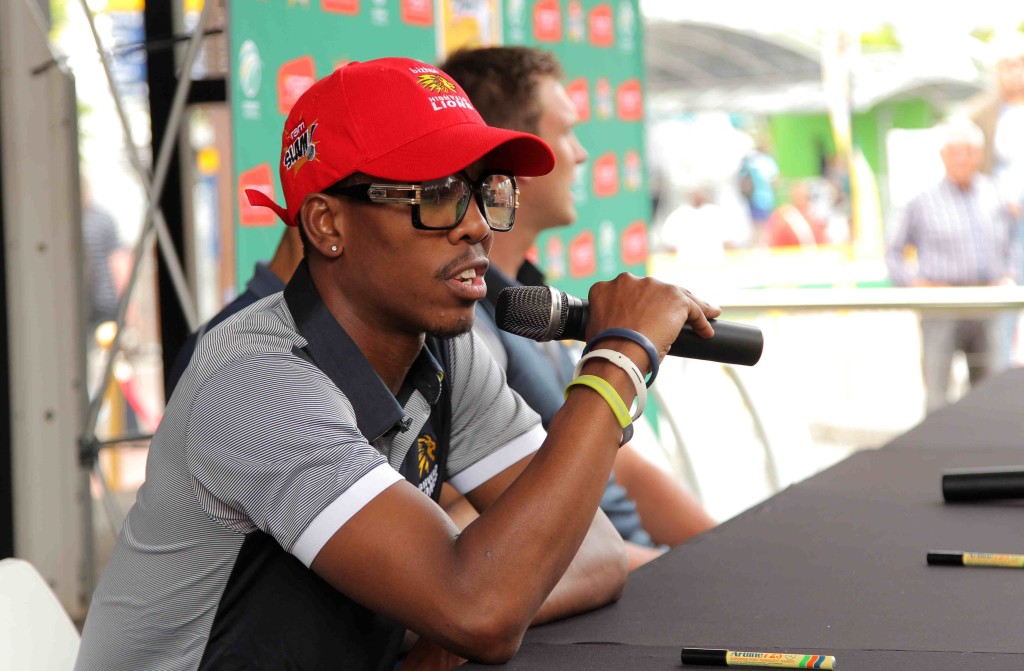Jean Symes and Thami Tsolekile’s careers could have taken a completely different route had they taken the opportunities presented to them.
In October 2012, the Highveld Lions reached the final of the CLT20 against the Sydney Sixers at the Wanderers. They batted first, nosedived to 9-4 against an attack featuring Josh Hazlewood, Mitchell Starc and Pat Cummins, and the contest appeared to be over before punters could down their second Castle.
Skipper Thami Tsolekile and Jean Symes had other ideas. They put together the best partnership of the Lions innings, nudging the home side to respectability. A renowned brawler, Tsolekile made a cussed 20, while Symes weighed in with a 46-ball 51.
In the euphoria of a 10-wicket Sixers victory afterwards, Brad Haddin, their skipper, asked if Symes would be interested in playing for the Sixers in the Big Bash. Symes was flattered but he told Haddin that he was a Lion down to the Velcro on the straps of his pads.
He’d take his chances at the Wanderers, thank you very much.
On Monday Tsolekile and Symes were named, along with Pumi Matshikwe and Ethy Mbhalati, as the latest four cricketeres implicated in the domestic match-fixing scandal. Gulam Bodi, who also played against the Sixers in that fateful final, was banned for 20 years in January for his role as the so-called fixing ‘mastermind’, with the four whose names were released on Monday receiving banning orders ranging from between seven and 12 years.
The longest sanction was received by Tsolekile, found by Judge Bernard Ngoepe to be guilty of ‘obstructing or delaying the investigation by destroying evidence that was relevant to it’. The comedown was complete for a player who once looked like a long-term successor to the fractious Mark Boucher when Ray Jennings temporarily took over the coaching of the national side from Eric Simons in 2003-4.
It was not to be. Boucher elbowed his way back into contention and it was not until his horrific eye injury in 2012 that Tsolekile’s name began to surface again. For a brief window the back pages were full of Tsolekile’s name; Gary Kirsten, the then national coach, was quoted approvingly and it looked – just briefly – that one of the most dedicated performers on the domestic circuit might qualify for a swansong in the international limelight.
It never happened. The enmity between then Proteas skipper, Graeme Smith, and Tsolekile is one of the worst-kept secrets in South African cricket, and Tsolekile was left to lick his wounds, playing out his final years as a pro in the increasing obscurity of the franchise game. ‘Bodi, Tsolekile, Matshikwe, Symes – all these guys conform to the stereotype of the vulnerable older cricketer who is anxious about being re-contracted and perhaps hasn’t taken care of himself financially in the smartest of ways,’ said a source close to the investigation. ‘OK, Symes was slightly younger but he was becoming a bit of a liability with a succession of injuries. All the literature tells you that it’s these kinds of guys or the very young guys – because they’re vulnerable and naïve – that the fixers tend to approach first.’
One of the ironies of the scandal is that in reaching the CLT20 final in 2012, the Lions players received a very good one-off payday. The green they received for losing by 10 wickets with over seven wickets of Sixers innings to spare, was nothing compared to the small change they would have received from Bodi and one, possibly two, groups of Indian fixers. But such was their disenchantment with the system; such was their cynicism and such was their financial desperation as some of them kept an extended family and endless hangers-on financially afloat, that they were prepared to entertain Bodi’s overtures. Most brushed them off. Some listened. All four named on Monday took matters significantly further. Then, to compound matters, they avoided investigators, tried to bury the trail of evidence and were generally obstructive, some of them telling their chief executives that they had nothing to hide.
Indeed, there were times when the investigators hit a brick wall. A high-profile administrator spoke of conflicting testimony, deleted cell phone and laptop records, a group of players who ran so scared that they seemed to have disappeared off the face of the earth. In the wake of Monday’s announcement it has become known that several players were prepared to take their chances at a tribunal, although an obvious problem here is that Bodi – who changed his testimony three times and his lawyer once – might have been more of a liability than anything else if called on to the witness stand.
So began a long and sometimes painful process of coaxing suspects towards the truth. The investigators have never sat still. That the investigation has taken so long is testimony to David Becker and his team’s indefatigability.
As CSA congratulated itself on a job well done this week, so speculation has moved to the fact two other players whose names have been mentioned in association with the fixing weren’t named on Monday. Haroon Lorgat, the CSA chief executive, was at pains on Monday at Newlands to point out that matters were continuing. It is hoped, say sources, that further revelations are forthcoming in the coming months.
Tsolekile and Symes, both SA U19 cricketers, might regretfully reflect in the weeks to come on roads not taken. What if the then young ‘keeper had made more of his chance under Jennings all those years ago? What if Symes had decided to become the privateer that so many of his colleagues have since become, seeking free agency and a contract in the Big Bash, one of the most lucrative domestic cricket tournaments in the world? What if? What if?
Written by Luke Alfred, a respected author and freelance sports journalist
Photo: Petri Oeschger/Gallo Images







